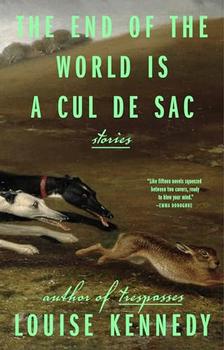Summary | Excerpt | Reviews | Beyond the book | Read-Alikes | Genres & Themes | Author Bio

Stories
by Louise KennedyMost of the stories in Louise Kennedy's debut collection follow women through the trials and tribulations of everyday life. Relationships, mortality, womanhood, loyalty, and memory are all placed beneath the microscope as we move throughout the collection, almost as though we are drifting around the titular cul-de-sac, glimpsing the loves, losses, hopes, and sorrows playing out behind each door.
An exact timeframe is never made clear, but one story, "Silhouette," stands out for being the only to make specific reference to the realities of life in the wake of the Troubles. In it, we see a young woman coming of age, wrestling with her love for her brother and the knowledge that he killed a man during the conflict that ruled the streets. Though the other stories rarely deal with subject matter this overtly political, several explore the theme of women attempting to live in a society that seethes with latent anger and a simmering threat of violence. Take "Hunter-Gatherers," for example, where a man is determined yet misguided in his attempts to live off the land. In a display of power and performative violence, he needlessly kills a wild hare, despite knowing his partner adores watching it: "There was a treacly hole at the front of his head, his eyes were hazel and still." The frank yet oddly lyrical prose in moments like this creates a sense of how normalized death and destruction have become under a cloud of modern toxic masculinity. Loss, for this generation of women, is simply a way of life.
The stories are often bleak in concept and narrative. While this can make them tough going if consumed as a whole, many offer subtle glimmers of hope, be it through deadpan humor, hard won resilience, or hints of possible change to come.
The rugged beauty of the Irish landscape forms a solid backdrop for the vast majority of the stories, as in the following quote from "Garland Sunday":
"The hillside sliced down toward the road, shorn like a lawn by the sheep that clung to it. In front of her, over fields and bog and a silver lake, were the hills of three counties. Behind her, the wind was blowing through the caves."
This sense of place is so well drawn that the instances in which the action strays outside of Ireland can feel slightly jarring. Still, there is never a feeling that any of the stories are filler. To maintain a consistently high standard across such a lengthy collection is impressive, but Kennedy pulls it off.
A couple of entries stand out as highlights: "Garland Sunday" and "Brittle Things." In the former, we look at the repercussions of a couple's decision to terminate an unwanted pregnancy. In the latter, we follow the mother of a non-speaking autistic child, as she attempts to simultaneously shield and nurture him in a world he finds overwhelming. To do so, she must navigate the frustrations of daily life, grapple with misplaced guilt, overcome her husband's denial about their son's condition, and face the constant pity of her friends and neighbors. Throughout the book at large, there is a sense of the weight held by words that go unspoken. This idea is presented most literally and poignantly in these two stories.
In a depiction that is direct and unflinchingly real, Kennedy brings a universal relatability to the notion that we all must trudge on in the face of life's melancholies. For this reason, almost every reader is likely to connect with the quiet struggles of at least one character found within The End of the World Is a Cul de Sac.
![]() This review was originally published in The BookBrowse Review in January 2024, and has been updated for the
January 2025 edition.
Click here to go to this issue.
This review was originally published in The BookBrowse Review in January 2024, and has been updated for the
January 2025 edition.
Click here to go to this issue.

If you liked The End of the World Is a Cul de Sac, try these:

by Guadalupe Nettel
Published 2025
From the International Booker Shortlisted author of Still Born, a powerful collection of stories about characters coping with estrangement, isolation, and the unknown.

by Caoilinn Hughes
Published 2025
From the writer Anthony Doerr calls "a massive talent," the story of four brilliant Irish sisters, orphaned in childhood, who scramble to reconnect when the oldest disappears into the Irish countryside.
Your guide toexceptional books
BookBrowse seeks out and recommends the best in contemporary fiction and nonfiction—books that not only engage and entertain but also deepen our understanding of ourselves and the world around us.